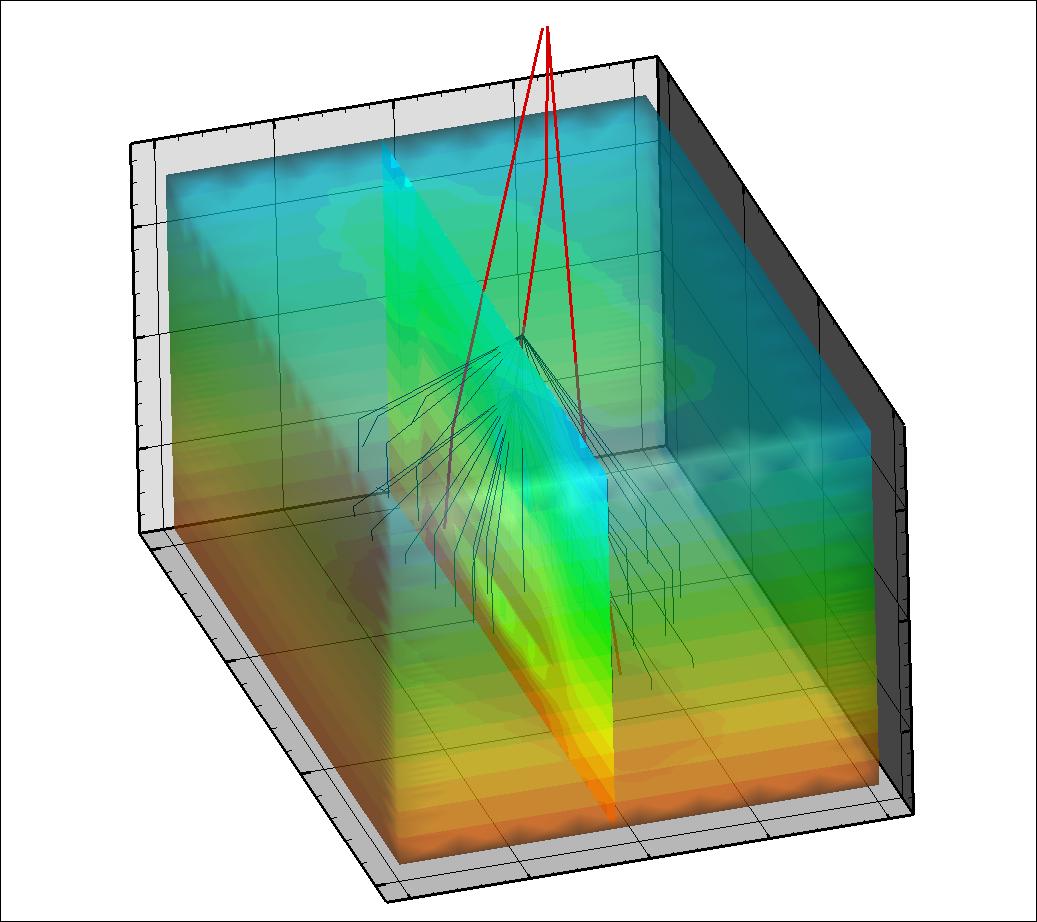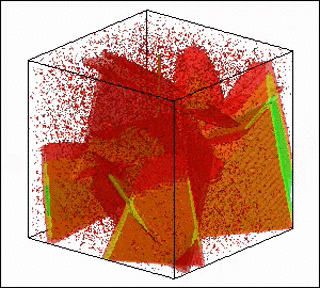Summary
 TOUGH3 offers the flexibility to handle different fluid mixtures, the properties of which are described in separate Equation-of-State (EOS) modules. TOUGH3 uses an integral finite difference method for space discretization, and first-order fully implicit time differencing. A choice of a sparse direct solver or various preconditioned conjugate gradient algorithms is available for linear equation solution. Thermophysical properties of water are represented, within experimental accuracy, by steam table equations. The program provides options for specifying injection or withdrawal of heat and fluids. Double-porosity, dual-permeability, and multiple interacting continua (MINC) methods are available for modeling flow in fractured porous media.
TOUGH3 offers the flexibility to handle different fluid mixtures, the properties of which are described in separate Equation-of-State (EOS) modules. TOUGH3 uses an integral finite difference method for space discretization, and first-order fully implicit time differencing. A choice of a sparse direct solver or various preconditioned conjugate gradient algorithms is available for linear equation solution. Thermophysical properties of water are represented, within experimental accuracy, by steam table equations. The program provides options for specifying injection or withdrawal of heat and fluids. Double-porosity, dual-permeability, and multiple interacting continua (MINC) methods are available for modeling flow in fractured porous media.
Although primarily designed for geothermal reservoir studies and high-level nuclear waste isolation, TOUGH3 can be applied to a wider range of problems in heat and moisture transfer, and in the drying of porous materials. The TOUGH3 simulator was developed for problems involving strongly heat-driven flow. To describe these phenomena a multi-phase approach to fluid and heat flow is used, which fully accounts for the movement of gaseous and liquid phases, their transport of latent and sensible heat, and phase transitions between liquid and vapor. TOUGH3 takes account of fluid flow in both liquid and gaseous phases occurring under pressure, viscous, and gravity forces according to Darcy’s law. Interference between the phases is represented by means of relative permeability functions. The code includes Klinkenberg effects and binary diffusion in the gas phase, and capillary and phase adsorption effects for the liquid phase. Heat transport occurs by means of conduction (with thermal conductivity dependent on water saturation), convection, and binary diffusion, which includes both sensible and latent heat.
TOUGH3 consolidates both the serial (TOUGH2 V2.1) and parallel (TOUGH2-MP V2.0) implementations, enabling simulations to be performed on desktop computers and supercomputers using a single code. TOUGH3 includes new PETSc parallel linear solvers in addition to the existing serial solvers of TOUGH2 and the Aztec solver used in TOUGH2-MP. The PETSc solvers can perform better than the Aztec solvers in parallel and the internal TOUGH3 linear solver in serial. TOUGH3 also incorporates many new features, addresses bugs, and improves the flexibility of data handling. Due to the improved capabilities and usability, TOUGH3 is more robust and efficient for solving tough and computationally demanding problems in diverse scientific and practical applications related to subsurface flow modeling.
Equation-of-State Modules
TOUGH3 provides multiple equation-of-state (EOS) modules, which define the components and phases and related thermophysical properties (such as density, viscosity, enthalpy) of the fluid mixture being considered. The chosen EOS module is linked to the TOUGH3 core, which sets up the mass and energy balance equations, and solves the resulting strongly coupled nonlinear algebraic equations using Newton-Raphson iterations for each time step, which involves the calculation of a Jacobian matrix and the solution of a set of linear equations.
The following table lists the currently available EOS modules and the components and phases they handle.
| TOUGH3 v1.0 | |||||
|---|---|---|---|---|---|
| Module | Components | Phases | Manual | Sample problems | Description |
| EOS1 | Water, water with tracer, heat | Aqueous, gas | TOUGH3 User’s Guide | r1q, rfp, rvf | Basic module for geothermal applications; see also EOS7 and EWASG |
| EOS2 | Water, CO2, heat | Aqueous, gas | TOUGH3 User’s Guide | rfp | Basic module for near-surface, gaseous CO2 applications; see also ECO2N, ECO2M, EOS7C, EWASG and TMVOC |
| EOS3 | Water, air, heat | Aqueous, gas | TOUGH3 User’s Guide | rhp, sam1 | Basic module for vadose zone applications |
| EOS4 | Water, air, heat | Aqueous, gas | TOUGH3 User’s Guide | rhp | Same as EOS3, including vapor pressure lowering effects |
| EOS5 | Water, hydrogen, heat | Aqueous, gas | TOUGH3 User’s Guide | n/a | Applicable to corrosion-gas producing waste repositories |
| EOS7 | Water, brine, air, heat | Aqueous, gas | TOUGH3 User’s Guide | rf1 | For multiphase, density-driven flows where salinity does not reach saturation levels; see also EOS7R, EWASG, ECO2N, and ECO2M |
| EOS7R | Water, brine, air, radionuclide1, radionuclide2, heat | Aqueous, gas | TOUGH3 User’s Guide | rdica, rdif7 | Same as EOS7, with parent-daughter radionuclides |
| EOS7C | Water, brine, NCG (CO2 or N2), tracer, CH4, heat | Aqueous, gas | TOUGH3 User’s Guide | sam7c 1-3 | Applicable to CO2 or N2 in natural gas (CH4) reservoirs; CO2 is gaseous or supercritical; real gas law; tracer |
| EOS7CA | Water, brine, NCG (CO2, N2, or CH4), gas tracer, air, heat | Aqueous, gas | TOUGH3 User’s Guide | sam7ca1ch4, sam7ca1co2, sam7ca2 | See flyer |
| EOS8 | Water, air, oil, heat | Aqueous, gas, NAPL | TOUGH3 User’s Guide | rcol8 | Oil component is not volatile nor soluble, i.e., it is present only in the NAPL phase (“dead oil”) |
| EOS9 | Water | Aqueous | TOUGH3 User’s Guide | reos9a, rpm | Richards equation; saturated-unsaturated flow |
| EWASG | Water, NaCl, NCG (CO2, air, CH4, H2, N2), heat | Aqueous, gas, solid | TOUGH3 User’s Guide | rhbc | Applicable to geothermal reservoirs with saline fluids and a noncondensible gas; temperature-dependent NaCl solubility; includes sal precipitation and dissolution |
| ECO2N | Water, brine, CO2, heat | Aqueous, CO2-rich phase | TOUGH3 User’s Guide | r1dv, rcc3, rtab, rtp7 | Applicable for simulation of geologic CO2 sequestration in saline aquifers; CO2 in gaseous, liquid and supercritical phases; no crossing of saturation line; salt precipitation and dissolution; see also EOS2 and ECO2M |
| ECO2M | Water, brine, CO2, heat | Aqueous, gaseous/liquid/ supercritical CO2 | TOUGH3 User’s Guide | r1d, rcc3, rtab, rwaf | Multiphase version of ECO2N; includes transition between super and sub-critical conditions, and phase change between liquid and gaseous CO2 |
| TMVOC | Water, VOCs, NCGs, heat | Aqueous, gas, NAPL | TOUGH3 User’s Guide | r2dl, r7c, rad, rblm, rbt, rdif2, rh2l, rtcem, rz2d | Three-phase module for simulating flow of multicomponent mixtures of VOC and one or multiple NCGs; see also TMVOC/T2VOC. |
NAPL: nonaqueous phase liquid
NCG: noncondensible gas
VOC: volatile organic compound
Features & Capabilities
TOUGH3 is a general-purpose numerical simulation program for multi-dimensional fluid and heat flows of multiphase, multicomponent fluid mixtures in porous and fractured media. TOUGH3 solves mass and energy balance equations that describe fluid and heat flow in general multiphase, multicomponent systems. Fluid advection is described with a multiphase extension of Darcy’s law; in addition there is diffusive mass transport in all phases. Heat flow occurs by conduction and convection, the latter including sensible as well as latent heat effects. The description of thermodynamic conditions is based on the assumption of local equilibrium of all phases. Fluid and formation parameters can be arbitrary nonlinear functions of the primary thermodynamic variables.
For numerical simulation the continuous space and time variables must be discretized. Space discretization is made directly from the integral form of the basic conservation equations, without converting them into partial differential equations. This “integral finite difference” method (IFDM) avoids any reference to a global system of coordinates, and thus offers the advantage of being applicable to regular or irregular discretizations in one, two, and three dimensions. The IFDM also makes it possible, by means of simple preprocessing of geometric data, to implement double- and multiple-porosity methods for fractured media. Time is discretized fully implicitly as a first-order backward finite difference. This together with upstream weighting of flux terms at interfaces is necessary to avoid impractical time step limitations in flow problems involving phase (dis-)appearances, and to achieve unconditional stability.
Applications
See TOUGH3 User’s Guide and bibliography.
Licensing & Ordering
Unlike previous versions of TOUGH, TOUGH3 is now released as a single package that includes both the core and all the EOS modules. The only exceptions are EOS7C-ECBM, T2Well-ECO2N, and EOS9nT, which will continue to be licensed separately.
- See price list of available TOUGH3 modules.
- See price list for special TOUGH modules (e.g., EOS7C-ECBM, T2WELL-ECO2N, EOS9nT).
Documentation
- TOUGH3 User’s Guide

- TOUGH3 Addenda
- ECO2N User’s Guide
- ECO2M User’s Guide
- TMVOC User’s Guide
- EOS7C User’s Guide
- EOS7CA User’s Guide
- Hysteresis Module User’s Guide
.
.
.
.